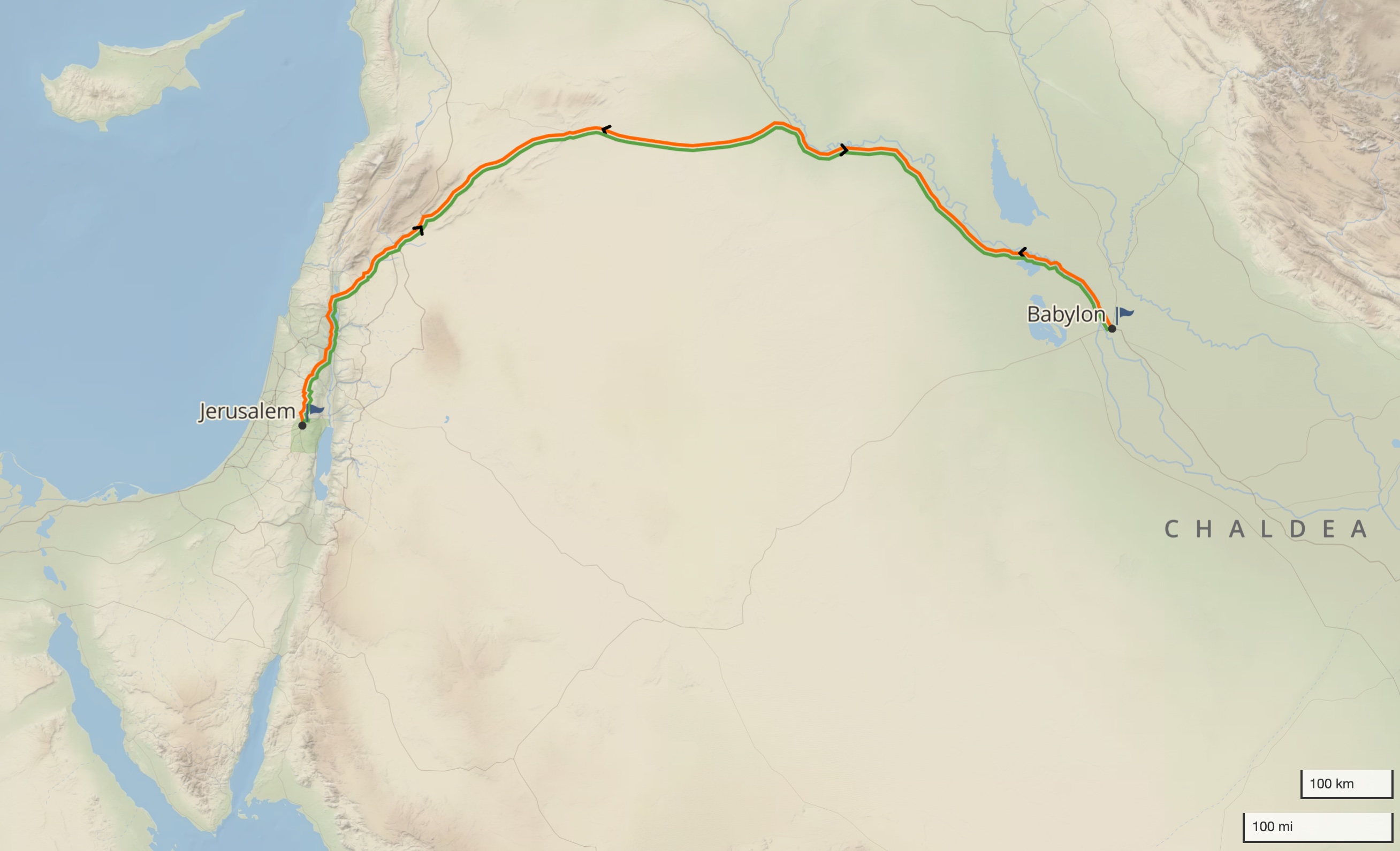|
|
Book of Daniel Bible Study
These Book of Daniel Bible study lessons cover the first six chapter of the Book of Daniel. They're designed to cover a chapter a week, offer study questions which you can download and print. Ideally, you would do this in a small group setting with others, coming together weekly to discuss and compare your answers.
Why a Book of Daniel Bible Study?

John Calvin provided his readers a great reason to study Daniel. He explains that in the Book of Daniel, we can see:
"How God proves the faith of his people in these days by various trials; and how with wonderful wisdom he has taken care to strengthen their minds by ancient examples, that they should never be weakened by the concussion of the severest storms and tempests; or at least, if they should totter at all, that they should never finally fall away.
For although the servants of God are required to run in a course impeded by many obstacles, yet whoever diligently reads this Book will find in it whatever is needed by a voluntary and active runner to guide him from the starting-post to the goal; while good and strenuous wrestlers will experimentally acknowledge that they have been sufficiently prepared for the contest."1
Because the Word of God is eternal, you and I can find the same thing in a Book of Daniel Bible study today.
"There is a God in heaven
who reveals mysteries"
Daniel 2:28
2020. Christian Standard Bible. Nashville, TN: Holman Bible Publishers.
The Book of Daniel is unique in that it tells us about both the past and the future.
In the first six chapters we see the past and in the last six chapters, we see the future.
Interestingly enough, we can find Jesus Christ in both the first, and the last six chapters.
Historical Setting for the Book of Daniel
 Jerusalem to Babylon
Jerusalem to BabylonAs you study the Book of Daniel, it's helpful to understand the background.
Daniel lived in the last days of the Judean Kingdom. He was about 15 years old when taken into captivity in 605 B.C by King Nebuchadnezzar and exiled to Babylon. The prophet Ezekiel and about ten thousand other Judeans were also exiled. Daniel’s lifetime spanned the reign of the last five kings of Judea:
- Josiah 640–609 B.C.
- Jehoahaz 609 B.C.
- Jehoiakim 609-597 B.C.
- Jehoiachin 598 B.C.
- Zedekiah 597-586 B.C.
Daniel witnessed the fall of the nation and the destruction of Jerusalem. Stephen Miller comments on this era in Jewish history:
"This was also a period of intense prophetic activity. Jeremiah was preaching in Jerusalem, and it seems almost certain that both Daniel and Ezekiel would have heard Jeremiah preach. Jeremiah’s influence is evident on Ezekiel’s writings, and he may have had a profound effect upon Daniel’s life as well. Habakkuk also preached during this general time period."2
When Jerusalem fell the faith of the chosen people of God surely must've been tested. Had the God of the Exodus who parted the Red Sea and rescued his chosen people forgotten them? Had the God who defeated the inhabitants of the Promised Land been defeated? Or was the prophet Jeremiah right all along? Was the God of Israel a just God? Was he not content to tolerate disobedience? And although patient over the many years of their disrespect and disregard, was he just in his allowance of the defeat of his chosen people?
Ronald S. Wallace provides some insightful perspective on this tumultuous period in Jewish history in his commentary. It’s helpful to understanding the setting for the Book of Daniel and is worth reviewing here.

“When all this actually happened most of the people of Judah had to change their views about how God was going to work out his purpose for them within human history, and fulfill his promises. They had been led astray in their thinking and planning by and interpretation of the Word of God too much in accord with their own self-centered desires. Their scriptures, as they had read them, and their tradition, as they had interpreted it, had seemed to teach them that God’s way of fulfilling his purposes for their nation was to be marked by certain inalienable principles.
The royal line of David was to continue uninterrupted, and indeed undisturbed, till the glorious second David, the promised Messiah, his lineal successor, appeared on his throne in Judea. Under his reign Israel was to experience its triumph and fulfillment as the centre of a great new world commonwealth in which peace and prosperity would flourish for all to enjoy. But till that day came their holy city, Jerusalem, and its temple were to remain standing free and inviolate as they had stood since the great days of David and Solomon as a sign that here God was going to do these great things.
Therefore when it all happened otherwise, and the inviolable city and temple were destroyed, it was hard for them to admit that God’s future for them had been intended to involve humiliation as well as glory, exile and shame as well as security and prosperity. Could God really use a pagan like Nebuchadnezzar in any way as an instrument for their good or for their education? Were they really expected to believe that when they were in his brutal hands they were still in the hands of God?
It was especially hard for them to see their temple ruined its vessels desecrated. They had bowed in awe before what they believed and felt to be the presence of God in that temple where these vessels were put to their exclusive holy use. Their tradition was full of stories which gave warning the no-one would ever be allowed to even lay profane hands on them without incurring dreadful and immediate retribution. But now a heathen monarch had dared, and had been allowed, to do precisely this!
They needed a new theology, and thinking it out was a slow process, involving heart- searching and controversy. The book of Daniel takes us into the world in which such problems were faced and thought through. But besides the problems of a new theology there were those of policy. They were now to live as a small minority group within an environment which they found sometimes threatening, sometimes friendly, but largely alien, to their culture and religious faith."3
But what does the Bible say about this period of Jewish history?
If we look for the biblical record on King Nebuchadnezzar, we see he is mentioned in no less than nine books of the Bible:
|
|
|
He is mentioned 32 times in Daniel, but much less in the other eight books, except Jeremiah, where he’s mention 37 times.
So what can we learn about this man from the prophet Jeremiah? Here’s a summary:
- Jeremiah described him as the King of Babylon (21:2), an enemy of King Zedekiah (44:30), but also as a servant of Yahweh (25:9; 27:6; 43:10).
- Jeremiah prophesied that he would not have pity or compassion and would not spare the Israelites (21:7).
We also learn from the prophet Jeremiah why God allowed Nebuchadnezzar to destroy Jerusalem and the temple and take his chosen people captive. That's covered in the study of Chapter 1.
Choose Your Book of Daniel Bible Study Below
Book of Daniel - Chapter One
Book of Daniel - Chapter Two
Book of Daniel - Chapter Three
Book of Daniel - Chapter Four
Book of Daniel - Chapter Five
Book of Daniel - Chapter Six
1 Calvin, John & Thomas Myers. 2010. Commentary on the Book of the Prophet Daniel. Vol. 1. Bellingham, WA: Logos Bible Software.
2 Miller, Stephen R. 1994. Daniel (The New American Commentary). Vol. 18. Nashville: Broadman & Holman Publishers.
3 Wallace, Ronald S. 1979. The Lord is King The Message of Daniel (The Bible Speaks Today). Leicester, England: Intervarsity Press. pp. 30-31
We pray this Daniel Bible study honors God and blesses you.